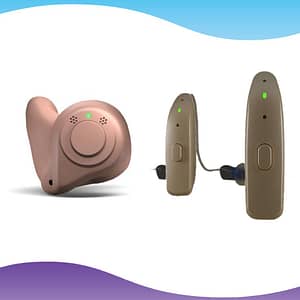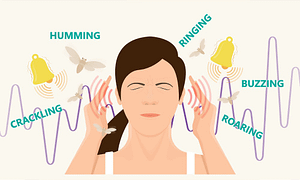When you start using a hearing aid system for the first time, the experience can be quite confusing – especially if your hearing loss came about gradually over many years. There are sounds you probably haven’t heard properly or clearly for quite some time, and your brain needs to readjust to interpreting those sounds.
Our audiologists at Hear4U will advise you accordingly when you have your hearing aids fitted, but here are ten top tips for first time hearing aid users – or even for experienced users who have upgraded to the latest devices available.
Don’t rush it – take your time and ask your family to help.
Don’t compare your hearing aid use with glasses. When you put on new glasses you immediately see more clearly, but it takes some time for you to get used to hearing aids. Please don’t expect your brain to remember how to hear, identify, and interpret every sound immediately. Hearing aids may even feel a bit weird at first if you’ve never worn anything before, so don’t be alarmed if you need to wear them for a few days, or even weeks before they become comfortable.
How to get used to your hearing aids
- Don’t compare your hearing aid use with glasses. When you put on new glasses you immediately see more clearly, but it takes some time for you to get used to hearing aids. Please don’t expect your brain to remember how to hear, identify, and interpret every sound immediately. Hearing aids may even feel a bit weird at first if you’ve never worn anything before, so don’t be alarmed if you need to wear them for a few days, or even weeks before they become comfortable. Background noise for Hearing Aid wearers can be your biggest enemy.
- Many simply couldn’t pick up on it before getting their hearing devices, but when it is there it can be very unwelcome. Dogs barking, children playing, traffic and even other conversations can make one to one situations in public places difficult.
- Research suggests that the ears of people with a hearing loss work differently to those with normal hearing when exposed to environments with lots of background noise. In noise the ear works harder to process all the different sounds at once, resulting in the signals to the brain becoming jumbled and the individual not being able to hear any sound clearly. It just keeps getting worse – the less the brain picks up on, the harder the ear works and the fewer signals it interprets correctly.
Why am I hearing loud noises?
Many simply couldn’t pick up on it before getting their hearing devices, but when it is there it can be very unwelcome. Dogs barking, children playing, traffic and even other conversations can make one to one situations in public places difficult.
Research suggests that the ears of people with a hearing loss work differently to those with normal hearing when exposed to environments with lots of background noise. In noise the ear works harder to process all the different sounds at once, resulting in the signals to the brain becoming jumbled and the individual not being able to hear any sound clearly. It just keeps getting worse – the less the brain picks up on, the harder the ear works and the fewer signals it interprets correctly.
How can my family help?
Family members need to speak a little more clearly and in a normal tone. There’s certainly no need to shout as it can cause sound distortion and discomfort. They also need to pay attention and get your attention first. Saying your name or simply making a gesture will definitely help. This will prepare you to listen, so you’re less likely to miss certain words.
The best position for them to talk to you is to face you directly. They need to stay relatively close (but respect personal space). If they’re too far away, you might not understand everything clearly. If you have better hearing in one ear, then they can focus on that particular side but not speak directly into that ear. It needs to be kept “normal” for you. Quite often if family/friends use different vocabulary, rephrasing things, will help you understand certain things better.
What do Audiologists suggest?
One step at a time
Hearing rehabilitation takes practice. When you’re using a hearing aid for the first time, start by wearing them for only a few hours at a time. If it gets to the point where you feel exhausted or overwhelmed you can remove them, but try to wear them a little longer every day. The longer you wear them, the better you’ll get at identifying sounds, interpreting voices, and focusing on what you’re hearing.
The true benefits of hearing aids are only eventually achieved through frequent use. As you are getting used to having them, you may forget to wear them some days – maybe leave a note on your bedside cupboard or bathroom door to remind yourself.
Read aloud to yourself.
Before you purchased your hearing aids, you may have been told to “stop shouting” from time to time. It’s natural to begin talking loudly when you experience hearing loss, but now you can properly regulate your own volume. One of the biggest complaints that new users make, is that they feel like they are shouting. This is because, like other sounds I’ve already described earlier, you haven’t heard your own voice properly for some time.
It sounds louder, deeper, and croaky to give a few descriptions I’ve heard from users in the 26 years I’ve been an audiologist. A good way to adapt to this is by reading to yourself while wearing your hearing aids. It not only helps you determine the appropriate volume for speech, but it also will help you get better at recognizing the sounds of words and speech again.
Read AND listen as often as possible.
Whenever you are reading a book, read along with the matching audiobook if possible. When enjoying television, watch with the subtitles on, to begin with. Reading along while you listen will help your brain get more familiar with associating sounds, words, and speech. Little things like this can make how you adjust to your hearing system easier and quicker.
Speak to family and friends – you need their help.
Loved ones can be really helpful during your hearing rehabilitation. Firstly, these visits can give you an opportunity to practice speaking comfortably in a group – after your initial period of wearing them in quiet places. This will help your brain relearn the connections between sounds, words, and non-verbal body language.
Try to practice with people you know well since these familiar voices are the easiest for your brain to identify and interpret. In my experience, since I qualified in 1994, your family can also help you adjust by setting the television at a comfortable volume to the level they would set it at – giving you the chance to listen and adjust to these new volumes. You shouldn’t be turning the volume on your television higher than a person without hearing loss would, or you could further damage your hearing.
Keep a hearing “diary”.
Keep track of and write down any noises that you hear that bother or irritate you. If your clock’s ticking seems too loud and starts to annoy you after a couple of days, make a note of it. If you still struggle to hear conversations in a crowded restaurant, write it down. By keeping track of your hearing issues, you can discuss these with one of our Hear4U audiologists at subsequent follow-up appointments.
If adjustments are made too quickly, then you may not have had the chance to settle down – so it’s not a good thing to complain too soon – your brain does the hearing and may need more time to settle. However, if we find that the settings do need to be altered, then, again, our audiologists will benefit from the information that you’ve written in your diary.
Be realistic – hearing aids can’t make your hearing “normal”.
Think about telephone conversations. Even with the best phones, there is still that subtle difference to the sound as a voice is transmitted over a phone line or by mobiles. The same goes for the sounds you hear with your hearing aids. You’re going to experience those sounds a little differently through hearing aids than you remember experiencing them before your hearing loss. That’s perfectly normal! Celebrate the improvements to your hearing, even if it’s not exactly the same as before.
Don’t adjust the volume too much if you are able to do so.
Hearing aid technology has advanced incredibly in the last few years. Quality hearing aids adjust to different listening environments automatically, so you shouldn’t need to manually adjust your hearing aids much – whether you use volume controls or an app on your mobile phone. When wearing hearing aids for the first time, it may be tempting to turn down the volume when you are going into a loud restaurant or turn it up when walking into a library.
You also may want to try to hear faint sounds from far away or hear in a way that normal ears can’t. By doing this, though, you are not only interfering with the hearing aid adjustment process, but you are also running the risk of further damaging your hearing.
Take advantage of new technology.
Hearing aids can now wirelessly connect with other electronic devices like mobile phones, computers, microphones, tv streamers, sound systems/speakers, and other compatible electronics so that the sounds being emitted (like mobile phone calls and tv streamers) can be sent directly to your hearing aid, further improving the clarity with which you hear these devices.
Be patient
When it comes to offering helpful tips for first time hearing aid users (or to those who’ve upgraded recently), Hear4U can’t stress this enough – your rehabilitation with hearing aids does take time. You need to be very patient with yourself and your hearing aids. If you take your time and follow the advice given in this blog, then you will be a long way towards settling down with the new world around you. Yes, it is noisy. However, you used to be able to hear all of those sounds when your hearing was normal – your aids are trying to help you hear those everyday sounds again.
Bonus advice
If you’ve been wearing your hearing aids for a while, it’s getting too much for you and you’re feeling a little overwhelmed, then it’s absolutely fine to take them out to give yourself a break. With consistent use, your brain will adjust to sound incredibly. Please don’t feel under any pressure if you are uncomfortable in certain situations at first – take them out and put them back in again when you are ready – the next day if necessary.
Hear4U will look after you every step of the way. If you need help, advice or an appointment, then, in the first instance, please call us to discuss your issues and we’ll either help you over the phone or make an appointment with one of our audiologists.



